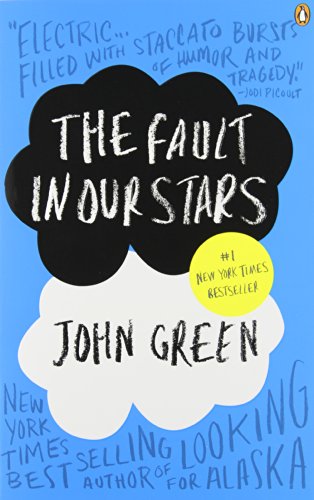All Nonfiction
- Bullying
- Books
- Academic
- Author Interviews
- Celebrity interviews
- College Articles
- College Essays
- Educator of the Year
- Heroes
- Interviews
- Memoir
- Personal Experience
- Sports
- Travel & Culture
All Opinions
- Bullying
- Current Events / Politics
- Discrimination
- Drugs / Alcohol / Smoking
- Entertainment / Celebrities
- Environment
- Love / Relationships
- Movies / Music / TV
- Pop Culture / Trends
- School / College
- Social Issues / Civics
- Spirituality / Religion
- Sports / Hobbies
All Hot Topics
- Bullying
- Community Service
- Environment
- Health
- Letters to the Editor
- Pride & Prejudice
- What Matters
- Back
Summer Guide
- Program Links
- Program Reviews
- Back
College Guide
- College Links
- College Reviews
- College Essays
- College Articles
- Back
The Fault In Our Stars by John Green
Not only is this novel the latest of YouTube sensation John Green’s works, it also happens to be one of his most acclaimed. Touted as a must read for any teenager, you can imagine my surprise when, upon turning the last page, I was left thoroughly disappointed.
“The Fault In Our Stars” is a novel that chronicles the life of a teenage girl, named Hazel Grace, facing a terminal illness. With not much to look forward to, hope is injected into her life through the introduction of Augustus Waters, another teenager who also happens to have cancer. Revolving around a budding love, the novel follows the exploits of Hazel and Augustus as they cope with their illnesses.
One of the first problems I see with this book is its premise. In my view, wrapping a story around two cancer patients, who happen to be much more insightful, intelligent and cynical than any teenager could possibly imagine, does the opposite of what Green intended. He has mentioned in the past that he was looking to bring a touch of reality to the world of the terminally ill. Seeing as many people do indeed tend to view the ill as “abnormal”, this is certainly a noble goal. However, I fail to see how elevating these teenagers to mythical proportions with their poetic language, divine wisdom, and ample use of complicated metaphor serves to portray teenagers who are going through tough times as normal people. What this does do however, is it allows the author to create seemingly relatable characters (because most of the readers would like to think themselves capable of similar wit and insight) in addition to plugging in quotable passages.
On a related note, the philosophy and “profound” passages espoused in the novel seem to lack any real insight. In most cases, if it isn’t another blatantly hackneyed cliché, it is a cleverly paraphrased proverb that has already been heard ad nauseum. There wouldn’t be anything wrong with this of course if it weren’t for the fact that many of the novel’s proponents seem to view the book’s philosophy as a redeeming quality. It also wouldn’t be as awful as I am portraying it if it weren’t for how unnatural and disruptive these passages were; everything from the people who spoke them to the situations in which they were said seemed very force. Throughout the novel, Green seemed very intent upon giving the reader profound insights, but it comes of as nothing more than a façade to mask what is really a collection of rather trite passages. For a novel that tries to denounce cliches concerning cancer patients, it is ironic to see just how often the author reverts back to cliches.
With all of this in mind, it is difficult for me to feel the pity that I believe Green was attempting to invoke. Using cancer patients seems like a gimmick to target the emotional fragility of the intended demographic. For myself, it even borders the line of insulting; to think that John Green felt he needed to fill his book with some of the most heavy handed and obvious tragic elements and characters in hopes of inciting an emotional response doesn’t speak highly of his opinion of his readership. Life is certainly filled with all sorts of tragedy and there’s something to say about an author is able to present misfortune subtly and in a way that all readers can appreciate.
Of course, the book has gained massive popularity (culminating in a recent film adaption) and has sold well, so Green was evidently very smart with how he went about formulating “The Fault In Our Stars”. This doesn’t excuse the many faults of the book however as its merit should not be based upon the literary equivalent of the “box office” (which is something many of Green’s proponents seem to argue).
Now, there certainly were many aspects of the novel that I liked as well! It was quite funny sometimes, the cynicism is both apt given the context and humorous and I think John Green is a fine person and a good writer. It’s just that, on the whole, “The Fault In Our Stars” comes off as a bit too forced and a bit too desperate in my estimations. For a certain subset of the teenage demographic, I’m sure it was very meaningful and well written. However, I don’t think the novel is deserving of all of its praise and that it ultimately leaves much to be desired.
Similar Articles
JOIN THE DISCUSSION
This article has 0 comments.

